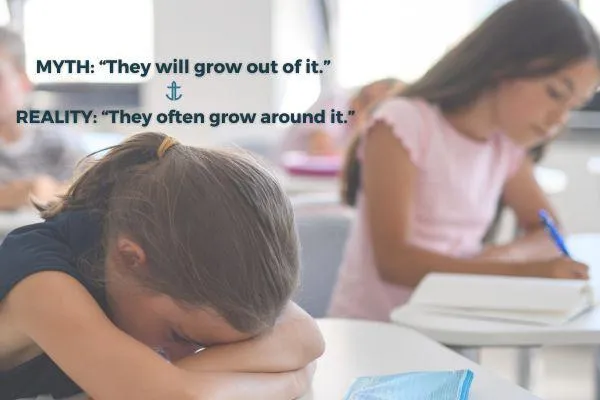
Why “They’ll Grow Out of It” Misses the Reality of ADHD
Why “They’ll Grow Out of It” Misses the Reality of ADHD
Anchored Insights
I often hear well-intentioned phrases like “Give it time,” “They’re just kids,” or “That’s just how boys are.” The hope behind those words is understandable, but waiting for a child to “grow out of it” can delay meaningful support and lead to avoidable frustration. Children do not typically outgrow ADHD. What actually helps them thrive is learning how to grow around it with the right guidance, tools, and understanding.
ADHD Doesn’t Disappear. It Changes Shape.
As children get older, ADHD symptoms often look different. A child who was always moving or climbing may grow into a teen who struggles more quietly with focus, organization, or follow-through. What begins as visible hyperactivity can become internal restlessness, mental agitation, or emotional overwhelm, especially in adolescents and girls.
The challenges do not vanish with age. They tend to shift into new areas such as school demands, independence, relationships, or emotional regulation.
What sometimes gets mistaken for “outgrowing it” is a combination of factors:
Developing coping strategies
Receiving accommodations or support
Better understanding of how their brain works
Growing executive function skills over time
Without this kind of help, the struggles do not go away. They simply show up differently.
Growing Around ADHD: What That Really Means
Children, teens, and young adults do not need to “overcome” ADHD. They need to learn how to work with their brain instead of against it. Growth looks different for each person but often involves:
Learning their strengths and limits
Using visuals, timers, structure, or routines
Asking for help at home or school
Managing transitions with support instead of shame
Practicing planning, pausing, and problem-solving
These approaches are not crutches. They are essential tools that build long-term confidence and capability.
Why Early Support Matters
Taking a “wait and see” approach can unintentionally lead to:
Academic struggles that affect self-confidence
Emotional dysregulation or shutdowns
Strained relationships at home or school
Anxiety, depression, or burnout in adolescence
Misunderstandings about a child’s abilities or intentions
When support is provided early—whether through skill-building, therapy, coaching, parent education, or school collaboration—children have a much better chance of growing into their strengths instead of getting stuck in their struggles.
You Don’t Have to Figure It Out Alone
If you have ever wondered whether a child will grow out of ADHD, you are not alone. Many families question what is typical, when to step in, and how much support is appropriate. Those questions are valid, and there are compassionate answers.
Understanding ADHD and executive function early gives children and parents options, not limitations. The goal is not to change who they are. The goal is to help them grow into themselves with clarity and support.
—
Grizelda Anguiano, MD, FAAP, CPC
Anchored Pediatric Mental Health
Anchored Coaching LLC
